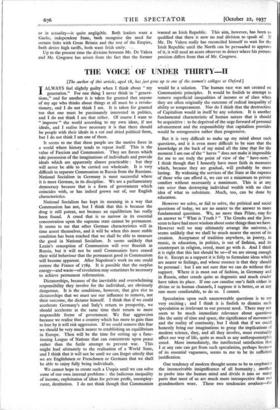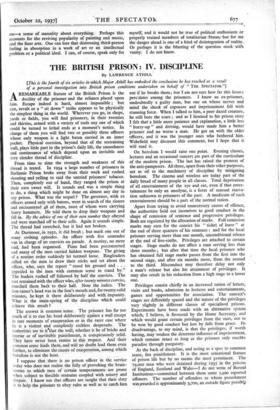THE VOICE OF UNDER THIRTY -H
[The author of this article, aged 18, has just gone up to one of the ,women's colleges at Oxford.] IALWAYS feel slightly guilty when I think about " my generation." For one thing I never think- in " genera- tions," and for another it is taken for granted that anyone of my age who thinks about things at all must be a revolu- tionary, and I do not think I am. It is taken for granted too that one must be passionately interested in politics, and I do not think I am that either. Of course I want to " improve " the world according to my own ideas, if not ideals, and I realise how necessary it is that there should be people with their ideals in a cut and dried political form, but I do not think I am one of them.
It seems to me that these people are the motive force in a world where history tends to repeat itself. This is the value of Fascism and Communism. They are forces which take possession of the imaginations of individuals and provide ideals which are apparently almost practicable : but they will never be able to be carried out wholesale. It is very difficult to separate Communism in Russia from the Russians. National Socialism in Germany is most successful where it is most German, in its discipline. We are a parliamentary democracy because that is a form of government which coincides with, or has indeed grown out of, our English characteristics.
National Socialism has kept its meaning in a way that Communism has not, but I think that this is because the drug is still potent, not because an equilibrium has really been found. A creed that is so narrow in its essential concentration upon the supreme state cannot be permanent. It seems to me that other German characteristics will in time assert themselves, and it will be when this more stable condition has been reached that we shall be able to measure the good in National Socialism. It seems unlikely that Lenin's conception of Communism will ever flourish in Russia, but it will not be until Communists have ceased their wild behaviour that the permanent good in Communism will become apparent. After Napoleon's work no one could restore the France of 1789. It is possible that the surplus energy—and waste—of revolution may sometimes be necessary to achieve permanent reformation.
Dictatorships, because of the inevitable and overwhelming responsibility they involve for the individual, are obviously dangerous. It is the conditions, however, that give rise to dictatorships that we must use our influence to remove, not their outcome, the dictator himself. I think that if we _could accelerate Germany's and Italy's return to prosperity, we should accelerate at the same time their return to more responsible forms of government. We fear aggression because we realise that a country which has more to gain than to lose by it will risk aggression. If we could remove this fear we should be very much nearer to establishing an equilibrium in Europe. Then will be the time for setting up a func- tioning League of Nations that can concentrate upon peace rather than the futile attempt to prevent war. This might lead ultimately to the realisation of a World State, and I think that it will not be until we can forget utterly that we are Englishmen or Frenchmen or Germans that we shall be able to enjoy fully being individuals.
We cannot hope to create such a Utopia until we can solve some of our own internal problems : the ludicrous inequality of income, exploitation of ideas for private profit, unemploy- ment, destitution. I do not think though that Communism would be a solution. The human race was not created on Communistic principles. It would be foolish to attempt to remove superficial inequalities of income or of class when they are often originally the outcome of radical inequality of ability or temperament. Nor do I think that the destruction of Capitalism would in itself be any solution. It is another fundamental characteristic of human nature that it should be acquisitive : to be deprived of the urge forward of personal advancement and the responsibility that capitalism provides would be retrogressive rather than progressive.
But it is very difficult to make up my mind about such questions, and it is even more difficult to be sure that the knowledge at the back of my mind all the time that for the moment I am one of the " haves " does not make it impossible for me to see truly the point of view of the " have-nots." I think though that I honestly have more faith in measures which, because they are gradual, will probably be more lasting. By widening the services of the State at the expense of those who can afford it, we can set a minimum to private comfort without necessarily a maximum. This is at any rate wiser than destroying individual wealth with no clear idea of what to substitute. Much, too, can be done by education.
However we solve, or fail to solve, the political and social questions of today, we are no nearer to the answer to more fundamental questions. We, no more than Pilate, stay for an answer to " What is Truth ? " The Greeks and the Jews seem to have had more wisdom about some things than we have. However well we may ultimately arrange the universe, it seems unlikely that we shall be much nearer the secret of its creation. Acceptance of tradition anywhere, in poetry, in music, in education, in politics, is out of fashion, and its counterpart in religion, creed, must go with it. And I think it is right that this last should be so—if we are strong enough for it. Except as a support it is folly to formulate ideas which are nearer to feelings, and whose essence is that they should be personal : but I am not sure that we can do without that support. Where it is most out of fashion, in Germany and in Russia, other creeds quite as dogmatic and much cruder have taken its place. If one can canalise one's faith either in divine or in human channels, I suppose it is better, or at any rate more comfortable, to do so. I cannot.
Speculation upon such unanswerable questions is to me very exciting ; and I think it is foolish to dismiss such speculation as irrelevant to our present need. There may not seem to be much immediate relevance about questions like the unity of time and space, the significance of movement and the reality of continuity, but I think that if we could honestly bring our imaginations to grasp the implications of modern science, they, and all they involve, must eventually affect our way of life, quite as much as any anthropomorphic creed. More irrunediately, the intellectual satisfaction that I at any rate can get from such speculation, perhaps because of its essential vagueness, seems to me to be its sufficient justification.
One tendency of modern thought seems to be to emphasi,e the inconceivable insignificance of all humanity ; another to probe into the human mind and divide it into so many parts that most of us are much more introspective than our grandmothers were. These two tendencies produce—for me—a sense of unreality about everything. Perhaps this accounts for the reviving popularity of painting and music, and the finer arts. One can lose that distressing third-person feeling in absorption in a work of art or an intellectual problem or a political ideal. I can, of course, speak only for myself, and it would not be true of political enthusiasts or properly trained members of totalitarian States;' but for me the danger ahead is one of a kind of disintegration of reality. Or perhaps it is the blurring of the question mark with vanity. I do not know.































































 Previous page
Previous page